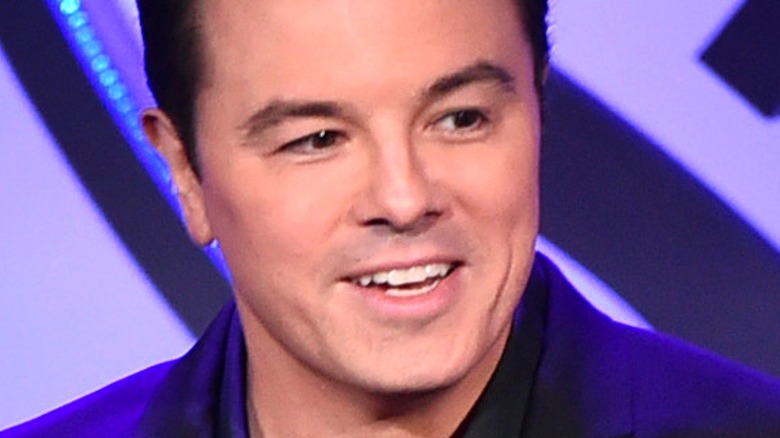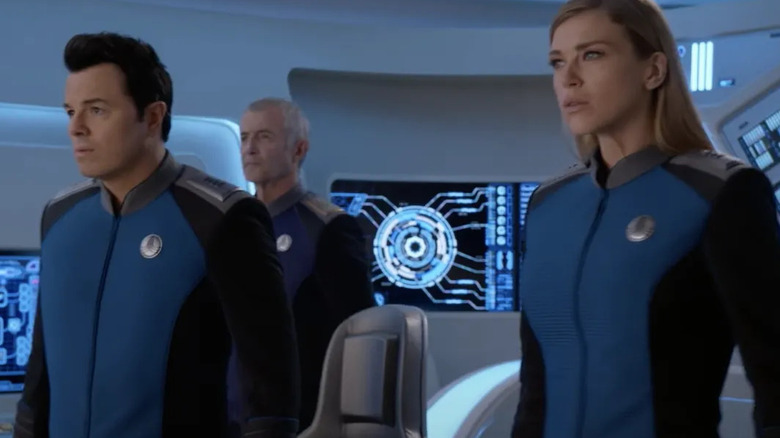Why Seth MacFarlane Likes Working On The Orville More Than His Other Projects
Seth MacFarlane is one of the most familiar names in television. Starting out as a writer on shows such as "Johnny Bravo" and "Dexter's Laboratory," MacFarlane rose to prominence over the past few decades as the creator behind animated shows such as "Family Guy" and "The Cleveland Show," and he also drew fame for voicing a number of characters across the three shows as well. While the comedian had previously made the jump to live-action with movies such as "A Million Ways to Die in the West," and "Ted," 2017 saw him make the foray into a new genre with the debut of the science fiction series "The Orville."
While "The Orville" is a riff on the "Star Trek" franchise, it's also a labor of love, clearly designed by a person who loves the long-running sci-fi franchise — and who, indeed, made "Star Trek" fan-films in high school (per YouTube). That said, MacFarlane has previously spoken about his desire to go in a different direction creatively with this series, calling it a "sci-fi comedic drama." At first, the series got off to a rocky start, but the show lasted for two seasons at Fox before making the jump to Hulu for its third season.
Recently, MacFarlane, who also writes and stars on "The Orville," spoke about his experience on the show, and made some surprising statements about how much — and why — he prefers it to other shows he has worked on.
The show's differing style appeals to MacFarlane
In the July 2022 interview with The Hollywood Reporter, Seth MacFarlane spoke about how his experience working on "The Orville" has been shaped by his work on shows such as "Family Guy" and the upcoming Peacock series "Ted." MacFarlane elaborated that the way comedy fits into "The Orville" is very different from his other shows, despite its reputation. "With something like 'The Orville,' it gets trickier because I've been very cognizant of how the humor fits into the show, and I know people love the humor," MacFarlane said. He later added that, as he put it, "Different shows have different needs."
However, the balance between humor and drama, and the sensitivity required by the sort of storylines that appear on "The Orville," are something that hugely appeal to MacFarlane from a creative standpoint, compared to the more loud and brash style that he previously pioneered with "Family Guy." He drew the comparison between the trans storylines on both "Family Guy" and "The Orville" — he acknowledged that in the cartoon, in his words, "You're always threading a needle, and in the past, there are things that we perhaps did not handle as expertly as we could" — but he stated that the behind-the-scenes dynamics and creative process behind his heartfelt sci-fi comedy drama appeal to him more than anything else he has ever worked on.
"'The Orville' just requires a different kind of storytelling," MacFarlane said, "and to be blunt, I enjoy it more. I've never enjoyed a writing process more than I have on this show."
The shift to streaming has also boosted the show creatively
Elaborating on "The Orville" and its move from Fox to Hulu between the second and third season, MacFarlane also spoke about how the change had affected the show. He pointed out that the freedom to approach difficult topics was the same in both places — he didn't think any of the storylines in the third season of "The Orville" would have been rejected by the Fox executives — but the new allowances in runtime and episode structure that Hulu gave them were hugely beneficial.
"You're not stopping six times for a commercial break, which always affects the structure of your story, and you're allowed to breathe on a streaming service," MacFarlane said, going on to elaborate that the need to cut the episodes to allow for the commercial breaks often leads to the sacrifice of nuanced character moments, such as watching their emotional reactions to major events. "It's tough to do that on a broadcast network because you have to cut everything down to 43 minutes, and not every story is 43 minutes long."


